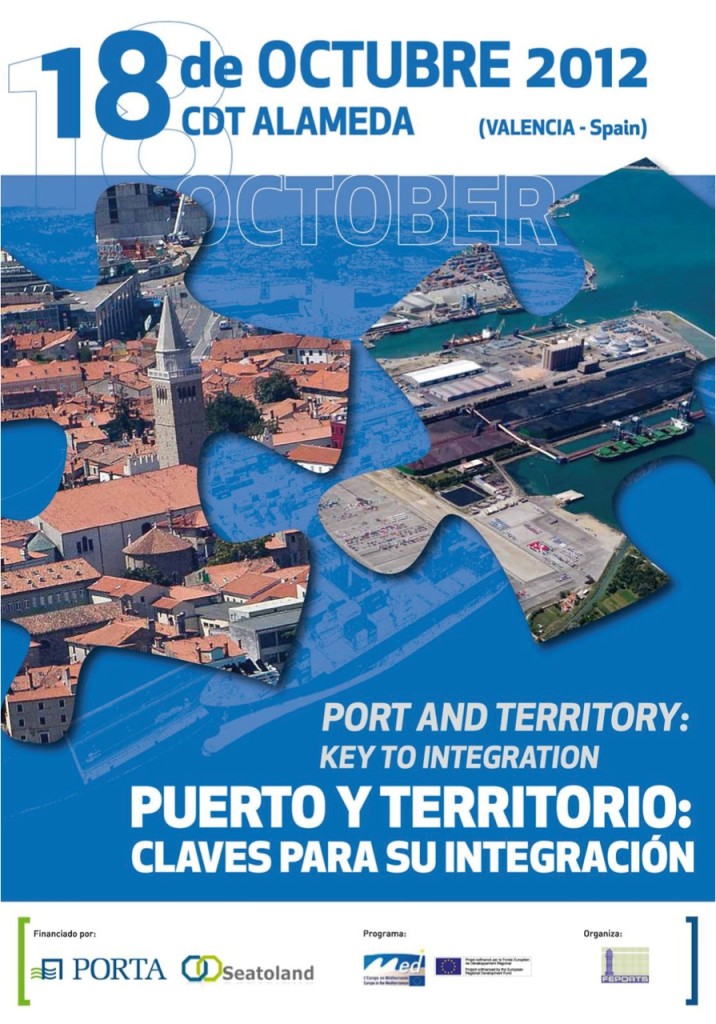The PORTA (Ports as a Gateway for Accessing Inner Regions) project brings together partners from five Mediterranean countries (FEPORTS -leader- from Spain, Port and University of Catania from Italy, Chamber of commerce & Industry of Marseille Provence from France, Piraeus Port Authority from Greece and Port of Koper from Slovenia). It was selected by the Selection Committee at the 2nd Call of Proposals of the EU Programme MED and is co-financed by the European Regional Development Fund.
PORTA aims to study how the improvements in accessibility to the port areas affect the efficiency of ports, and how they reduce the environmental impact of transport-related activities, particularly in those cases in which the port is surrounded by urban areas, through the definition of common strategies and integrated transport/land use planning procedures.
Therefore, starting from the premise that there are bottlenecks in the access to ports that have a negative effect on its operations and its territorial integration, the project proposes to tackle this problem by applying both port and spatial planning and management instruments under an integrated approach, by addressing these problems not only in the port, but also in its immediate hinterland. The project thus aims to help to overcome the typical constraints which traditionally interfere in the territorial and urban integration of ports, such as the dichotomy between transport policies (based on global approaches) and the territorial and urban policies (based on local and regional approximations), the traditional mistrust between ports and local governments, and the barriers of sectoral planning.
Among the results of the project is the design of ad-hoc instruments, under an integrated approach to key sectoral issues (e.g. infrastructure congestion, pollution, land use and urban integration of general transport systems, among which is the port itself) that should be addressed and carried out under a shared vision, as it cannot be otherwise, with different territorial actors.
To reach this objective, the following work sequence is being completed:
– To identify those management areas in which interactions occur with port activity, under a broad approach, in its immediate catchment area, and what are the social and territorial stakeholders involved.
– To analyze, on the above basis, the coherence of port and territorial planning in order to detect possible synergies and mismatches, and how they might affect the future evolution of both the port activity and these interactions that occur in the territory.
– After identifying the aspects to be addressed and the agents involved, it is being determined, under a single strategy, the most appropriate instrument to be addressed, the identified issues, and the road map to be followed in order to implement it.
In the particular case of port waterfronts, they are extensions of the city with common problems caused by the presence of other infrastructures (e.g. railways or motorways), but with great potential as catalysts in urban transformation by its central nature and often symbolic character.
The objectives of the current paradigms used in urban regeneration, often involve recovering central urban areas with a focus to strengthening their identity and allowing them to take advantage of the economic, social and environmental opportunities offered by its reorganization. This balance between the preservation of the identity of the urban fabric and the transformation of run down inner city port activity abandoned areas, is particularly delicate in Mediterranean waterfronts for obvious reasons of scale and cultural heritage.
In this sense, the different approaches and exchange of experiences resulting from interregional cooperation certainly enriches the work and the results obtained.
All project reports will be available on the project website: https://www.porta-project.eu once completed, expected in June 2013.
